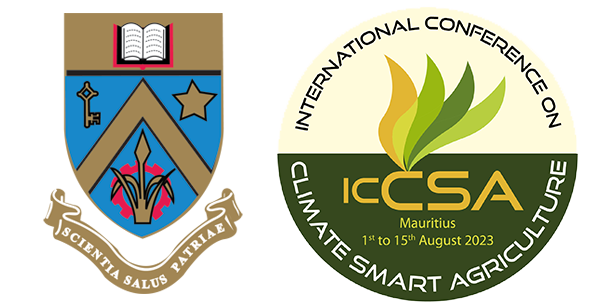Conference Background
An international conference on Climate Smart Agriculture will be held in-person and in virtual mode from the 15th to 17th August 2023 at the University of Mauritius on the island state of Mauritius. The conference is being organised by the University of Mauritius in collaboration with the Mauritius Agricultural Marketing Cooperative Federation (MAMCF), the Mauritius Cooperative Alliance Ltd (MCA), with funding from the European Union and the Australian Government, and sponsorship from the SUN Resorts Hotel Group. This conference will bring together scientists, researchers, planters, students, policy makers, decision-makers, NGOs, and the media with a view to sharing knowledge and data about the concept, the practices, and the benefits of CSA in different crops and different settings locally and internationally.
Climate change is a global challenge, but its impacts are affecting developing countries the most. Smallholder agricultural and food producers are being particularly impacted, directly as well as indirectly. It is therefore essential to increase their resilience, and their ability to adapt, to the changing climate. Climate change is causing an increase in temperature, erratic patterns of rainfall, extreme events such as droughts and floods, rising sea levels, salinisation of the soil, increase in pests and diseases, and declining soil fertility and health. Planters often respond to these changes by adding more and more fertilisers and pesticides in order to get an adequate crop yield. Such responses are not environmentally-friendly and are unsustainable in the medium and long term. It is therefore essential to provide planters with alternative technologies to face these challenges in a way that will ensure sustainability of their production, enable them to adapt to these climatic changes in a way that is environmentally friendly, while at the same time reduce the level of greenhouse gas emissions that their agricultural practices produce. Climate Smart Agriculture (CSA) is considered to be one of the most sustainable approaches to meet these challenges posed by a changing climate.
Climate Smart Agriculture can help provide planters with a sustainable livelihood, contribute to national food security, be productive, environment-friendly and climate resilient (Adaptation), while at the same time producing lower levels of greenhouse gas emissions (Mitigation). Climate Smart Agriculture can also contribute to helping a country meet its SDG and UNFCCC commitments through the reduction in greenhouse gas emissions from agriculture.
One of the key constraints to the adoption of CSA is that it is not sufficiently understood by planters, nor by many other stakeholders. It is therefore imperative to disseminate information and data about CSA to planters, agronomists, scientists, researchers, technicians, policy makers, decision-makers, NGOs, media, as well as to our youth.
This international conference aims to sensitise planters, extension personnel, decision makers, youth, NGOs, and other stakeholders of the immense possibilities that CSA has for enabling planters to become resilient, to continue earning a livelihood even with climate change, while also reducing greenhouse gas emissions. It will also enable scientists, researchers, agriculturists and other practitioners from various countries to share evidence-based information, data, and experience in CSA and thereby to learn from each other for more efficient and effective adoption of CSA.
The conference is being organised in the context of an ongoing farmer-participative project, funded by the European Union under its GCCA+ Flagship Initiative “Supporting Climate Smart Agriculture for smallholders in the Republic of Mauritius”, and the Department of Foreign Affairs and Trade of the Australian Government.


